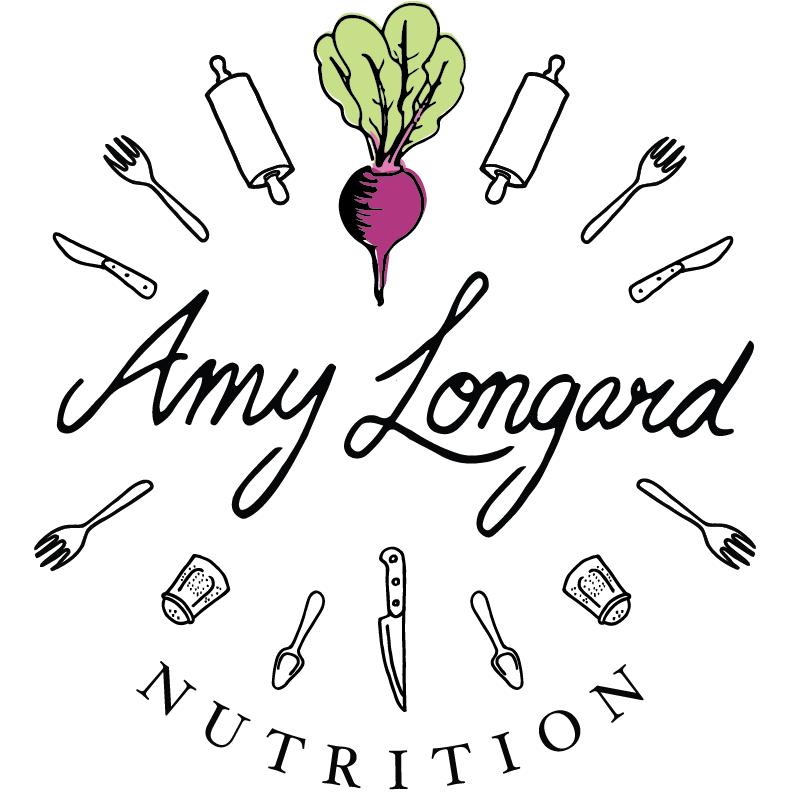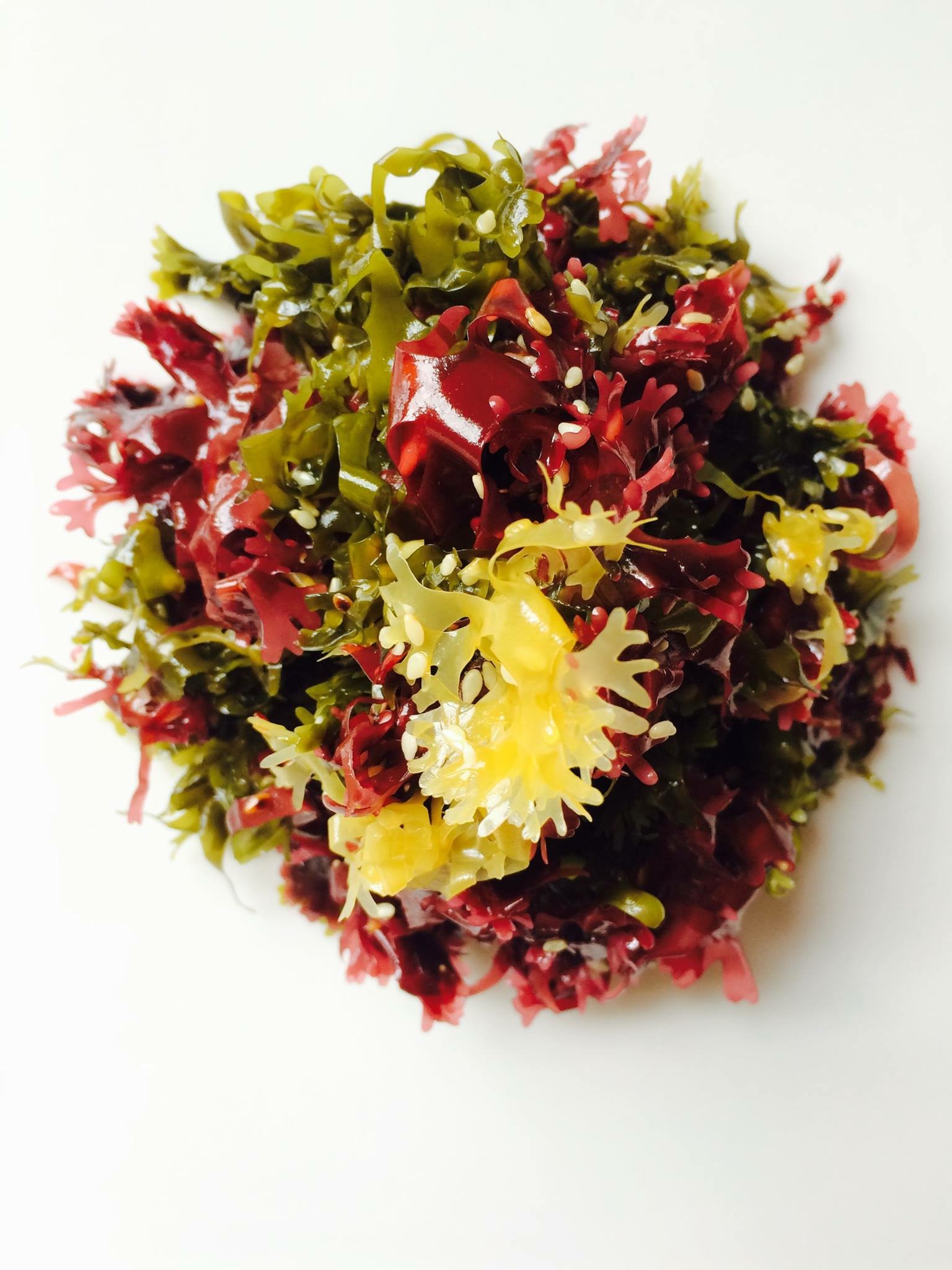Seaweed Salad + Q&A with Mermaid Fare
If you didn’t already know, I’m a huge fan of sea vegetables. Growing up in Nova Scotia, I have memories of eating dulse chips with my dad. My family also hosted Japanese exchange students throughout my childhood. During those years, I remember trying and loving the exotic seaweed-based snacks and learning how to make sushi using nori (a variety of seaweed) with our students. Overtime seaweed salad and sushi were mainstays in my diet, but it wasn’t until I went to culinary school and took a weekend course on seaweed that I truly began appreciated its versatility and vast health benefits.
I recently had the pleasure of meeting somebody who enjoys seaweed just as much as I do (if not more!). When I was home in Nova Scotia this past March, I met Taylor Widrig. As the owner of Halifax-based company Mermaid Fare, she's made an entire career out of sourcing and selling different kinds of seaweeds and creating seaweed food products. She sells seaweed snacks, seaweed salts, and varieties of seaweeds during the summer and fall at the Halifax Seaport Farmers' Market and in select retail locations. She also sources seaweeds for local restaurants and sells many of her products via her online store at www.MermaidFare.com. She's a true sea vegetable aficionado.
Besides running Mermaid Fare, Taylor is also a chef. She spent the last few winters in the Caribbean living and working on yachts as a private chef. When she's home in Nova Scotia, her other culinary services include seaweed-based cooking lessons and the occasional catering gig (fun fact: she'll actually be working at my wedding this summer). When she's not selling seaweed or busy cooking, she’s been known to put on a mermaid tail and go swimming in the ocean. Yep, she also moonlights as a mermaid! Clearly, Taylor is one of the most interesting gals around and I'm really excited to share my interview with her.
Read on to learn how her company came to fruition and how she sources the products she uses in her business. She also talks about the benefits, varieties and uses of seaweed, gives us the scoop on carrageenan (which is somewhat of a controversial topic in the natural health world these days) and she even shared one of her most popular recipes.
Amy: Mermaid Fare is such an amazing and unique concept! How did it come to be?
Taylor: Mermaid Fare was created in 2013 after completing Living Light Culinary Institutes’ Raw Culinary Arts program in Northern California. Initially it began as a raw food/vegan culinary education and catering company offering private cooking classes, dinner parties and retreats while actively promoting sea vegetables for health. Six months after starting, I decided I wanted to grow a product line that would benefit others and seaweed was front and center – combining my passion for sea vegetables and healthy snacks.
Amy: Seaweed is a true super food. Can you tell us a bit about the health benefits?
Taylor: Seaweeds, also known as sea vegetables, offer a wide range of nutrients including 56 minerals and trace elements, omega-3 fatty acids, and B vitamins. There are three families of seaweed – green, brown, and red. Kelp is a brown seaweed, Dulse and Irish Moss or Hana Tsunomata belong to the red kingdom, and sea lettuce in the green family. Sea vegetables are a wonderful source of plant based protein and iron, making them a suitable option for vegans, vegetarians and anyone looking to add more nutrients to their diet.
There are many studies being done today on the correlation between seaweed and weight loss, as well as sea vegetables ability to help remove heavy metals from the body while offering immune support after exposure to radiation. Apart from the internal health benefits, seaweeds have been used throughout the ages and in modern times in beauty products for their skin softening and clarifying effects.
Amy: Where do you source your products? What kinds of seaweeds are included in your product line?
Taylor: Mermaid Fare’s sea vegetables are sourced within the Canadian Maritimes. Our wild harvested varieties including wakame, kombu, dulse, and sea lettuce are sourced from the Bay of Fundy where sea vegetables thrive in the cool water and rising tides. Our cultivated variety, Hana Tsunomata is produced by Acadian Seaplants Ltd. in Nova Scotia which uses state of the art on-land aquaculture systems to create a traceable and aesthetically beautiful product. Mermaid Fare’s mission as a company is to promote sustainability, community, and to create quality and trusted products while constantly evolving within the industry.
Taylor in Copenhagen by the "Little Mermaid" statue.
Amy: I know you were recently in Copenhagen for the International Seaweed Symposium. You mentioned that carrageenan was the hot topic. I've heard mixed messages and I’m so curious to hear what you’ve learned!
Taylor: Some controversy surrounds ‘carrageenan’, which is extracted from Irish Moss and used widely in the food industry for it’s thickening, gelling, and stabilizing properties. Carrageenan is commonly found in vegetarian and vegan products because it replaces the animal ingredient ‘gelatin’, providing a similar and ethical result.
Carrageenan is a safe food product but has gotten a bad rap over the years due to a negative article that told readers carrageenan contributed to intestinal inflammation. It is suggested the author of this article may have had a bias motive for their research, and once the negative story was told it was hard to sway the public’s perception of the product. (Amy’s notes: when I was away in West Cork, Ireland, cooking for a yoga retreat, I discovered that carrageenan was used often in cooking, particularly for thickening soups.)
Amy: Can you share a recipe that might appeal to somebody who's new to seaweed? Or maybe give us some tips on how to use seaweed?
Taylor: A super simple seaweed recipe is our signature vegan and gluten free Kaiso Seaweed Salad using Hana Tsunomata (see below for the recipe). Other popular ways to include sea vegetables in the diet is to use brown seaweed like kombu in soup stocks, or to use dried dulse or sea lettuce in place of salt sprinkled on soups, salads, sandwiches, etc.
MERMAID FARE'S KAISO SEAWEED SALAD
Ingredients:
15g Hana Tsunomata (approximately 1 cup)
1 tablespoons maple syrup
1 tablespoon rice vinegar
2 tablespoons gluten free tamari
2 teaspoons sesame oil
1/4 cup toasted sesame seeds
Directions:
Rehydrate Hana Tsunomata in room temperature water for ten minutes. Drain, and shake or pat dry excess water.
Whisk together wet ingredients, pour over seaweed and mix well. Stir in toasted sesame seeds. Let the salad marinate for a minimum of 20 minutes before serving.
Stays fresh for up to one week in the refrigerator. Freezes well.
Want more Mermaid Fare? Visit Taylor's website or follow her on Facebook, Instagram and Twitter.




